School of Pharmacy alumni commit to improving health, access to care in their hometowns
By Emma Gran
Every graduate of the University of Wisconsin–Madison School of Pharmacy leaves a mark on the world — a unique legacy built by their own passions, experiences, and successes. The School’s nationally-recognized Doctor of Pharmacy program has an outstanding record of alumni changing lives and improving health outcomes across the world.
PharmD graduates are presented with limitless opportunities to participate in the field of health care in many settings — rural or urban, ambulatory or community, far or near. Some graduates move across the country to pursue their professional career, others find opportunities around Wisconsin, and another, smaller group returns home.
Several of the School’s PharmD alumni have moved back to their hometown to elevate care where raised, including Native, Hmong, Puerto Rican, and rural communities. Kymberly Ludwig (PharmD ’19) and Zoua Yang (PharmD ’09) are already giving back to their home community in their roles as licensed pharmacists, and Beatriz Jimenez Cadilla (PharmD ’19) and current third-year PharmD student Aaron Gehrke are on their way, strengthening their expertise for their return home.
Each of these individuals is dedicated to improving the health of the community that supported them in their youth. Read their stories on why they decided to return to their hometown, what’s special about their community that motivates them, and how it feels to give back in the community they grew up in.
Kymberly Ludwig: Oneida Nation of Wisconsin
Since April 2021, Kymberly Ludwig (PharmD ‘19) has been working as a clinical staff pharmacist in the tribal clinic where she received care growing up. Located near Green Bay, Wis., the Oneida Community Health Center is one of few health clinics providing affordable care and medications for approximately 16,000 Oneida tribal members residing in the area.
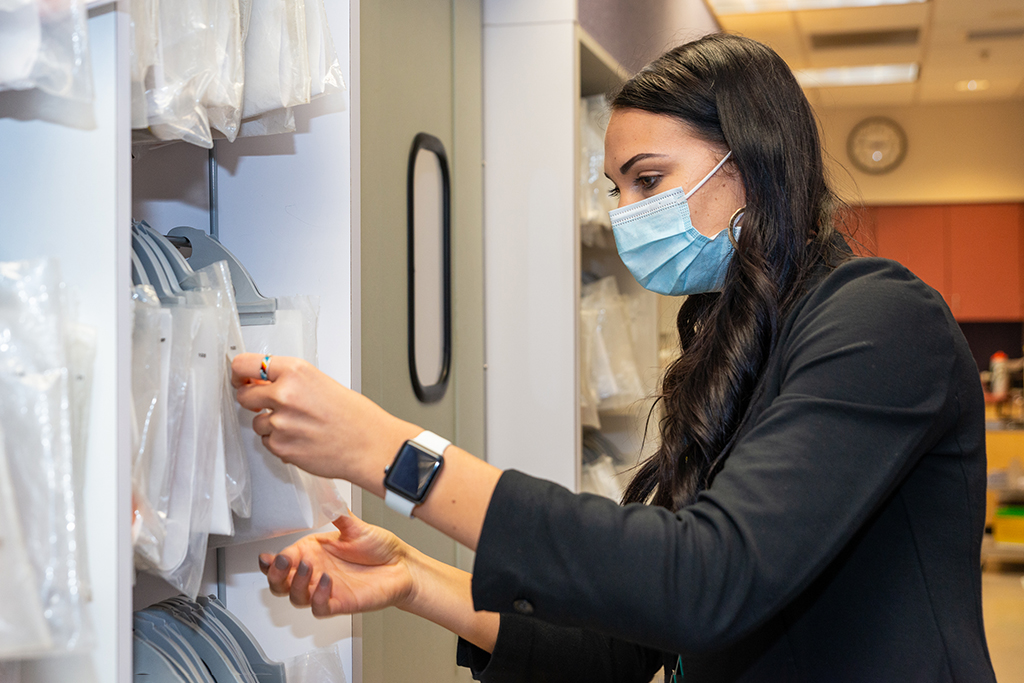
Ludwig would make the one-hour trip to the clinic, their closest tribal healthcare center, with her three siblings a few times per year in her youth. Now, with over 10 years of education behind her, Ludwig has returned to the clinic — on the other side of the pharmacy counter.
“I had the decision in the back of my mind since I started college. I wanted to get all the training and learn everything that I possibly could to help my community — returning home to work with Native patients was my ultimate goal,” she says. “I feel so honored and blessed to be working with my own tribal community and giving back as a Native American pharmacist.”
Because she was already familiar with the facility and some patients and providers, Ludwig quickly settled into her role at the Oneida Community Heath Center, one of the largest outpatient prescription dispensing facilities in Northeast Wisconsin.
Ludwig’s busy workdays are split between patient services, maintaining accurate inventory, dispensing medications and other administrative work dealing with insurance or billing matters. Of all her responsibilities, Ludwig most looks forward to the time spent face-to-face with patients.
“I get a lot of validation and joy when I see a patient one-on-one and I can watch them grow, fight addiction, or work toward their goals,” she says. “I always feel fulfilled after interacting with patients.”
“I feel so honored and blessed to be working with my own tribal community and giving back as a Native American pharmacist.”
—Kymberly Ludwig
Ludwig’s passion and commitment to improving the health of her Native community was fostered by close family in her younger years. She was inspired by her grandmother, who worked as a community health representative for the Lake Superior Band of Chippewa, and her mother, a medical transcriptionist. Ludwig recalls how visiting her grandmother and hearing of her experiences assisting Native patients taught her the importance of caring for her people.
“Whenever I was visiting, I would ask all these questions about her work and she could tell that I had the capacity for caregiving in my heart,” Ludwig says. “My grandmother would always encourage me to get a higher education so that one day, in some form, I could help our tribal members. And that always stuck with me as I got older.”
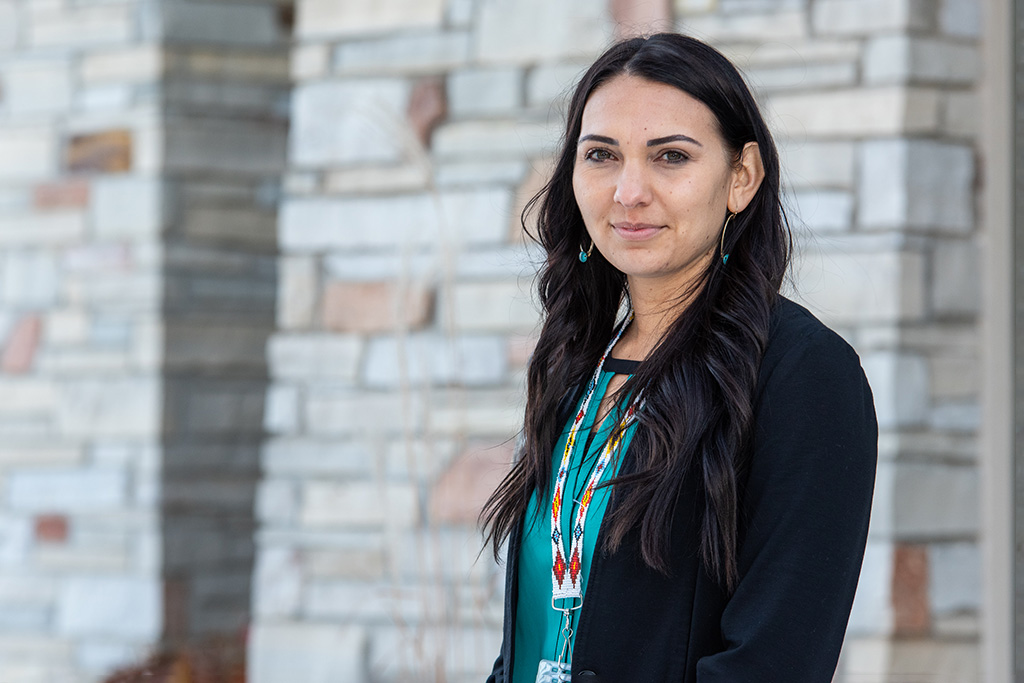
Her mother also played an instrumental role in Ludwig’s decision to pursue pharmacy. By attending job shadows and lunches set up by her mother with pharmacists she worked with, Ludwig decided the pharmacy field was the right fit for her interests and goals.
Ludwig earned her PharmD degree in 2019 from the UW-Madison School of Pharmacy, a Master of Public Health with a certificate in American Indian Studies in May 2018 from North Dakota State University, and a BS from UW-Stout. She also completed a PGY-1 residency program with the Indian Health Service at the Phoenix Indian Medical Center.
“I’m looking to get board certified next, because I know that if I don’t do it, then they’re not going to have that extra level of care that they deserve in these tribal clinics,” Ludwig says. “I have a lot of energy, and I have a lot of ambition, still to do more for our patients.”
Zoua Yang: Wausau, Wisconsin
Even as Zoua Yang (PharmD ‘09) left her hometown to pursue an education at UW–Madison, she knew she would be back in Wausau, Wis., one day.
“I always knew I wanted to come back and help the community that had helped me,” she says. “I’m connected to Wausau, it’s home for me. I wanted to give back to the community that gave to me, and be that person, the role model that I had here, for somebody else.”
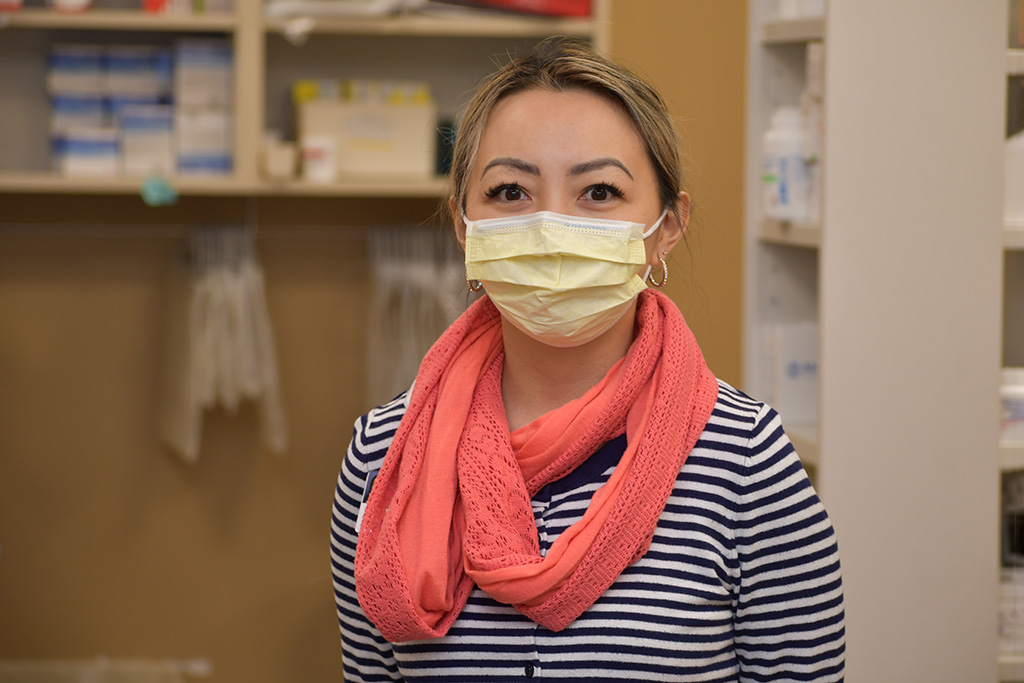
After earning her PharmD in 2009, Yang returned to the Wausau area to serve all patients, including her own Hmong community, who often face additional obstacles to staying healthy and accessing care.
“It was really important for me to come back and help my Hmong community, especially because a lot of them live in poverty and have lower levels of education,” Yang says. “I wanted to be a reliable resource for them, to help them with their healthcare — translating things, understanding their medications, and just being a connection for them in the community.”
Wisconsin is home to 50,000 Hmong people, and the Hmong community makes up about 12 percent of the population in Wausau — the highest percentage of any Wisconsin city. The Hmong are members of an ethnic group originating in Laos, Thailand, Vietnam and neighboring countries. Following the Vietnam War, more than 100,000 Hmong refugees sought resettlement in the U.S., and many were resettled in Wisconsin, where local organizations and church groups sponsored refugee families.
As a first-generation Hmong American, Yang leverages her heritage and cultural knowledge to connect with the Hmong patients she interacts with in her role as a pharmacist at Aspirus Wausau Hospital and pharmacy manager at the CVS located within the Weston Target store.
“Breaking down cultural barriers and providing access to care is something I’ve looked forward to my whole life.”
—Zoua Yang
Health communication barriers — nearly a third of Hmong people age 65 and older don’t speak English — and other structural obstacles, like inadequate transportation, access to insurance coverage, and discrimination, can all contribute to poorer health outcomes for this group. Yang hopes to overcome some of these barriers by continuing to be a trusted member of the Hmong community in her hometown.
Along with her position as pharmacy manager, Yang also serves as a district initiative expert, helping CVS implement new programs in pharmacies throughout the Midwest, including leading CVS’s effort to vaccinate residents in long-term care facilities against COVID-19. In conjunction with the Centers for Disease Control and the health departments of Wisconsin and Michigan, Yang oversaw and coordinated vaccinations for thousands of people in more than 500 clinics in the northern two-thirds of Wisconsin and Michigan’s Upper Peninsula.
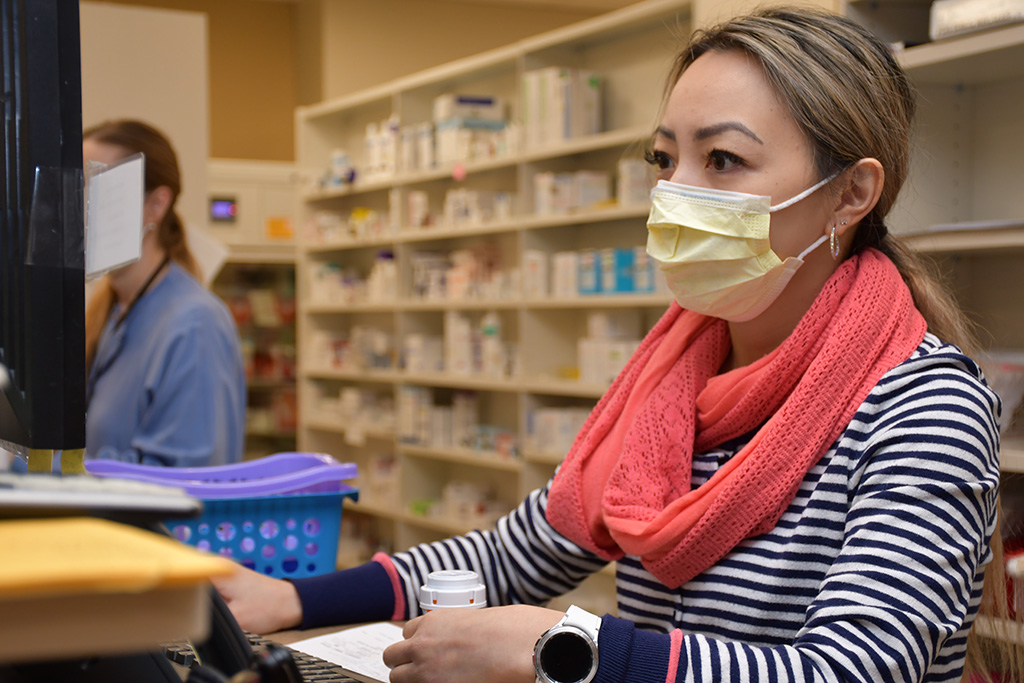
She says her education at the UW–Madison School of Pharmacy helped to prepare her for the challenge.
“Going to UW–Madison definitely changed my life,” she says. “There were so many opportunities to expand and do different things, and I had so much support from my professors and the School of Pharmacy community.”
She says being a pharmacist was the perfect career path for her, just the right combination of science, business and community work.
“It’s been a privilege to practice in my hometown and it feels great to know I am accomplishing the goals I set out with,” Yang says. “Breaking down cultural barriers and providing access to care is something I’ve looked forward to my whole life. Seeing some successes already just pushes me forward.”
Beatriz Jimenez Cadilla: Miami and Puerto Rico
In her application to the UW–Madison School of Pharmacy, Beatriz Jimenez Cadilla (PharmD ‘19) explained her motivations to pursue a doctorate degree as simply as she could: learn at a leading university and bring advancements in pharmacy practice back to her home country of Puerto Rico.
“I have a genuine passion to take care of patients in need, and I know that in Puerto Rico, there’s a big need,” says Cadilla. “I’m very excited to go back, see what the need is with my own eyes and work to address those needs.”

Cadilla was born and raised in Guaynabo, a suburb of Puerto Rico’s capital city San Juan. She became interested in biochemistry and patient care in her adolescence, but it was ultimately Puerto Rico’s health care crisis that pushed her to pursue a doctorate degree in the United States. So, at the age of 23, and after earning an undergraduate degree from the University of Puerto Rico, she left her island home, but she always planned on returning after finishing her studies. The opportunities to explore global health and areas of pharmacy outside of community pharmacy are what drew her to UW–Madison.
“In my experiences in Madison, I was seeing how interconnected health systems are, how smoothly patients are being taken care of, and how pharmacists impact patients at so many different points in their care,” she says. “It really motivated me to continue learning about these systems and how they could improve care in Puerto Rico.”
A continued exodus of health care professionals, large-scale migrations in the last decade and an aging population are undermining Puerto Rico’s health care infrastructure and negatively impacting the health of the country’s 2.8 million people. And with high rates of chronic health conditions — half of all adults have at least one chronic disease — the existing health care network is unable to meet demand.
“If there is a need, there is an opportunity. I am looking forward to returning to Puerto Rico and helping to support the health of my community.”
—Beatriz Jimenez Cadilla
“Seeing my mom wait for so long to get an appointment to see her cardiologist or receive her medications for diabetes is my main driver,” says Cadilla. “It’s not fair, and I am going to try to make as much of a difference as I can.”
Pharmacists are few and far between and very few work in ambulatory care settings — Cadilla’s passion.
“I would love to practice as a clinical pharmacist in an ambulatory care setting within a primary care clinic working through collaborative practice agreements,” she says. “I loved learning about and participating in this type of practice in Wisconsin and it is a model I want to take back to Puerto Rico.”
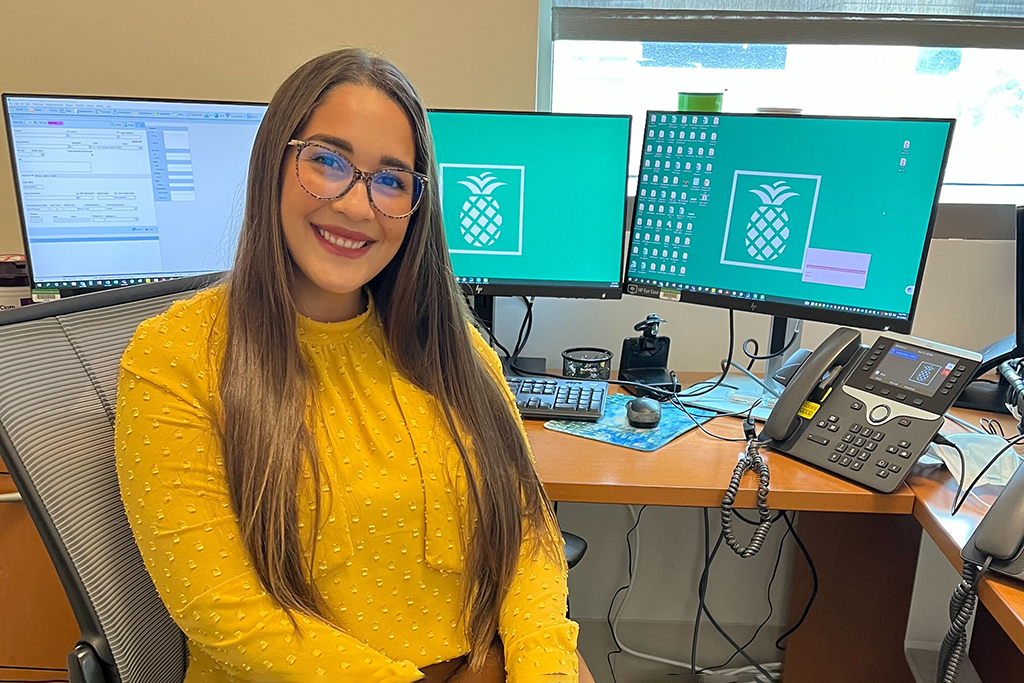
After her graduation from the UW–Madison School of Pharmacy in 2019, Cadilla completed a PGY-1 residency in Utah and a PGY-2 residency at Baptist Health in Miami, after which she became a pharmacy clinical ambulatory specialist at Miami Cancer Institute, part of Baptist Health.
Although her new position — which is the first neurology pharmacist in her organization — delays her return to Puerto Rico, she says she is still serving a similar role.
“At Baptist Health, I am still serving a diverse population and implementing services that advance pharmacy practice,” she says. “And I’m building the experience necessary to do the same in Puerto Rico.”
Cadilla is also forging connections with the School of Medicine in Puerto Rico and University of Puerto Rico and hopes to hold a faculty position one day.
“If there is a need, there is an opportunity,” says Cadilla. “I am looking forward to returning to Puerto Rico and helping to support the health of my community.”
The Gehrkes: Phillips, Wisconsin
Growing up in a small, rural Wisconsin town, PharmD student Aaron Gehrke’s favorite activity was visiting his dad in the family pharmacy.

“When I was younger, it was a big treat to go visit my dad and see him working behind the counter,” Gehrke says. “I grew up wanting to become a pharmacist, and that has never changed.”
Now in his third year of the PharmD program at the UW–Madison School of Pharmacy, Gehrke will soon become a third-generation pharmacist, following in the footsteps of both his father and grandfather, who are also Badger pharmacy alumni.
“For me, this is always what I have wanted to do, and it is exciting to know I will carry on the family tradition,” he says. “I’m excited to finish my degree and take care of the community I grew up in.”
Gehrke says his family gave him space to make his own decisions and never pressed him to continue the family tradition of pharmacy, especially because of the rising challenges of operating a small, independent community pharmacy. He explored other options in the health care field — even completing an internship in a veterinary office in his senior year of high school — but he could not be swayed from his commitment to becoming a pharmacist.
Similarly, his education at the School exposed him to other types of pharmacy practice beyond community-based care, yet Gehrke says he is still drawn to serving a smaller base of patients.
“Going back home to serve the patients I have known my whole life or have always gotten their medications from my dad or grandpa, and building on those lifelong connections, is really what I am looking forward to and why I want to return home.”
—Aaron Gehrke
“Going back home to serve the patients I have known my whole life or have always gotten their medications from my dad or grandpa, and building on those lifelong connections, is really what I am looking forward to and why I want to return home,” says Gehrke.
Thomas Gehrke (BS ’69), Aaron’s grandfather, originally wanted to become a science teacher, but he found his passion in community pharmacy and purchased Lakeview Pharmacy in 1973. Today, Lakeview Pharmacy is operated by Timothy Gehrke (BS ’92), Aaron’s father.
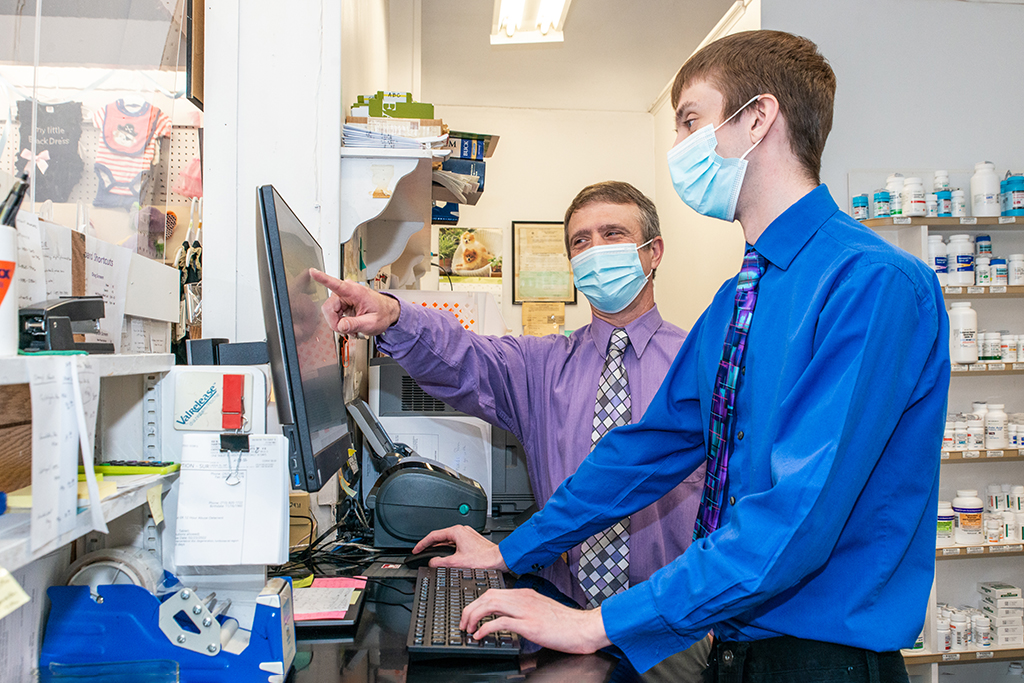
“I decided community pharmacy suited my goals the best. I could own my business, live in a small town, and have a smaller clientele that I could get to know as I serviced their prescription needs,” Thomas Gehrke says. “It was an honor to have my son, Tim, decide on pharmacy as a profession and eventually take over Lakeview Pharmacy.”
One of two pharmacies in Phillips, Lakeview Pharmacy serves as a point of access for care in the rural Northwoods. Tim Gehrke is currently one of the few accessible health professionals in the area for patients who must drive long distances to reach their primary care provider, hospital, or clinic.
“In a smaller community like Phillips, you know almost everyone who walks in the door, and it creates a close working relationship,” he says. “When my father purchased Lakeview Pharmacy, I’m sure he never anticipated it being a three-generation business, but I am so glad that it will be.”